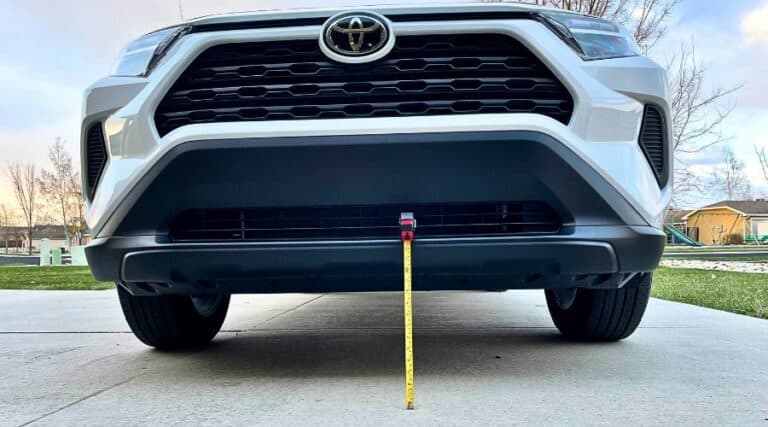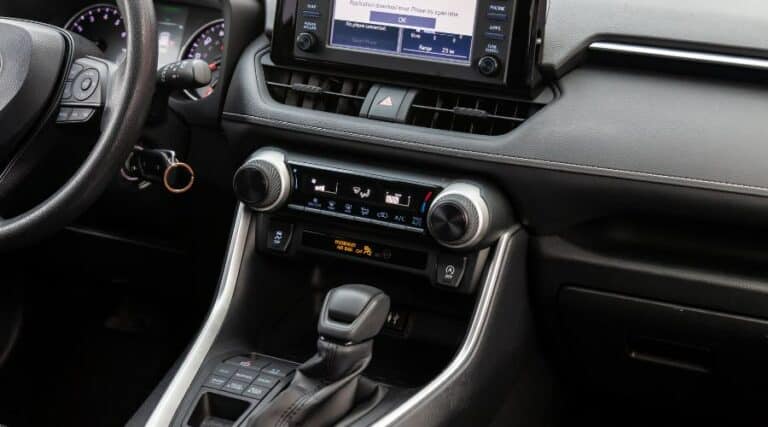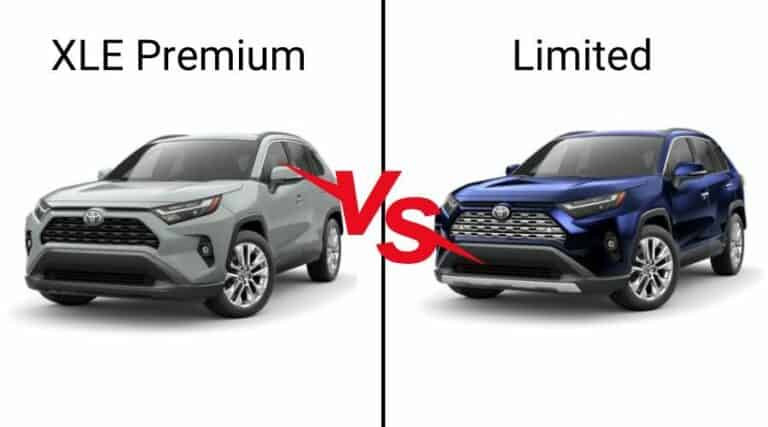Is Toyota RAV4 Hybrid Federal Tax Credit Eligible? (2023)
Does RAV4 Hybrid Qualify for Tax Credit?
As electric vehicles become increasingly popular, many are looking to take advantage of the federal electric vehicle tax credit. The Toyota RAV4 Hybrid has been a favorite among drivers due to its impressive fuel economy and low emissions.
The Toyota RAV4 is not eligible for the federal electric vehicle tax credit despite its eco-friendly credentials. It is primarily ineligible because it does not have the plug-in feature that is typically found in electric vehicles.
In this article, we’ll discuss why the Toyota RAV4 Hybrid does not qualify for the tax credit and provide potential alternatives for those looking to purchase an energy-efficient vehicle in 2023. We will also answer frequently asked questions about the electric vehicle tax credit so that you can make an informed decision about your next car purchase.
Is the RAV4 Prime eligible for the Federal Tax Credit? See RAV4 Prime tax credit details.
- Understanding the Federal Electric Vehicle Tax Credit
- Does RAV4 Hybrid Qualify for Tax Credit?
- Why Does the Toyota RAV4 Hybrid Not Qualify?
- Will the Toyota RAV4 Hybrid Qualify in the Future?
- Assessing the Benefits of Owning a Toyota RAV4 Hybrid
- Examining the Drawbacks of Owning a Toyota RAV4 Hybrid
- Potential Alternatives to the Toyota RAV4 Hybrid
- Frequently Asked Questions (FAQs)
Interested in a RAV4? Use our easy gas mileage calculator to check the RAV4 MPG by year and trim.
Understanding the Federal Electric Vehicle Tax Credit
The federal electric vehicle (EV) tax credit is a one-time nonrefundable credit offered with the purchase or lease of specific eco-friendly vehicles. This tax credit from $2,500 to $7,500 in savings depending on the battery capacity of the vehicle and other factors.
However, the Inflation Reduction Act (IRA) brought about certain rule changes for 2023-2032. Key aspects like car classification, income limits, and manufacturing prerequisites have been modified.
Tax Credit Qualifications
To qualify for the EV or plug-in hybrid tax credit must meet the following criteria:
- Purchased between January 2023 and December 2032
- Made in North America
- At least 40% U.S./free trade agreement country-sourced battery minerals account for $3,750 of the new credit
- A minimum of 50% U.S./free trade agreement country-sourced battery components constitute another $3,750 of the new credit
- Battery capacity not less than 7 kilowatt hours (kWh)
- Gross vehicle rating below 14,000 pounds
- EVs priced under $25k qualify only for a maximum of $4,000
Previously, Toyota, Tesla, and GM were knocked out due to the 200,000 EVs cap per automaker. But under new guidelines, they’re back in the game.
Buyer Requirements
Buyer requirements include:
- Individuals must earn an adjusted gross income of no more than $150,000
- Head of household earners’ adjusted gross income must not exceed $225,000
- Joint filers need an adjusted gross income under $300,000
Used Vehicle Requirements
For used EV credit seekers, these additional requirements are applicable:
- Credit accounts for 30% of the sale price, up to $4,000
- Individuals can’t purchase vehicles for resale purposes
- Buyer can’t be the original owner
- Buyer can’t be claimed as a dependent on someone else’s tax return
- Purchaser hasn’t applied for another used vehicle credit within three years
- Adhere to new income guidelines ($75,000 for individuals, $112,500 for head of household, $150,000 for joint filers)
- EV sale price must be less than $25,000
- The car must be at least two years old
- The gross vehicle weight rating must be less than 14,000 pounds
- Battery capacity must be a minimum of 7 kWh
With new adjustments, a maximum of $7,500 credit is accorded to new EVs and no more than $4,000 (30% or less of the sale price) for used EVs.
Is the RAV4 a good car? See this in-depth review on whether or not the RAV4 is an all-around good car.
Does RAV4 Hybrid Qualify for Tax Credit?
Unfortunately, under updated regulations, the RAV4 Hybrid doesn’t qualify for the tax credit since it lacks a plug-in feature. The renewed credits strictly pertain to plug-in electric and plug-in hybrid vehicles.
However, there are several other fuel-efficient alternatives available that do meet the criteria and therefore can take advantage of this incentive. Here is a list of all qualifying vehicles by manufacturer on the IRS website.
Why Does the Toyota RAV4 Hybrid Not Qualify?
The primary reason why the Toyota RAV4 Hybrid misses the mark for qualification is its non-plug-in nature. As it stands, traditional gas-electric hybrids don’t make the cut for tax credits.
Even if we were to imagine the RAV4 Hybrid as a plug-in model like its sibling, the RAV4 Prime, it would still not be eligible. The Reason? Currently, it falls short of meeting the required battery production standards, rendering it unsuitable for inclusion.

Will the Toyota RAV4 Hybrid Qualify in the Future?
Predicting the future is very challenging, especially when it comes to evolving environmental guidelines. As it stands, gas-powered hybrids don’t make the cut unless they’re designed for plug-in charging. With regulations growing stricter, it’s unlikely that they will relax anytime soon.
The manufacturing location of the RAV4 Hybrid resides in Kentucky and Canada so that meets the North America requirement.
Nonetheless, obtaining essential minerals and battery components from within the US or free trade suppliers could present a considerable hurdle. Toyota may need to make certain adjustments and realign resources to achieve this goal.
In light of these challenges, they’ll likely concentrate on developing electric vehicles (EVs) that meet the requirements for the tax credit in the future. The future holds exciting possibilities for Toyota’s EV range that could seize these incentives. Toyota also is leading the way with hydrogen powered vehicles and I’m hopeful of the future possibilities.
What’s the difference between the RAV4 Hybrid and Prime? See the RAV4 Prime vs Hybrid: EV mode compared.
Assessing the Benefits of Owning a Toyota RAV4 Hybrid
There are plenty of reasons why owning a Toyota RAV4 Hybrid could be the smart choice for you even if it doesn’t qualify for a federal tax credit. The RAV4 is the most popular SUV on the market, see 9 reasons why.
Let’s dive into the advantages you’ll enjoy with this vehicle:
- Save on Fuel: The RAV4 Hybrid’s impressive fuel efficiency – 41 MPG in city driving and 38 MPG on the highway – makes it a top contender among SUVs. Your wallet will thank you as you cruise past the gas stations.
- Go Green: With lower emissions compared to conventional vehicles, choosing a RAV4 Hybrid means reducing your carbon footprint and contributing to a healthier planet.
- Enjoy the Ride: Experience seamless handling and zippy acceleration, thanks to the RAV4 Hybrid’s smooth performance and instant torque – perfect for those who seek both efficiency and excitement in their drive.
- Cut Maintenance Costs: The RAV4 Hybrid’s simpler design means fewer parts needing regular upkeep, saving you money on maintenance over time.
- A Smart Investment: A robust resale value ensures your RAV4 Hybrid stays valuable should you decide to sell or trade it in later.
- Stay Safe: The RAV4s advanced safety features that include a rearview camera, blind-spot monitoring, and lane departure warning will bring you and your passenger’s peace of mind.
- Customizable: While the RAV4 comes well equipped right off the dealer’s lot, it also can be modified and customized with plenty of added accessories such as a lift kit (learn all you need to know about lifting a RAV4) and other mods making it ready for light off-roading, camping, or overlanding.
Phew! Owning a Toyota RAV4 Hybrid also gives you peace of mind knowing that reliability, eco-friendliness, high performance, and reduced maintenance costs come standard with your purchase. So go ahead – grab life by the wheel and enjoy your RAV4 Hybrid journey!
Examining the Drawbacks of Owning a Toyota RAV4 Hybrid
Although the Toyota RAV4 Hybrid boasts numerous advantages it also has several drawbacks when compared to its gasoline-powered sibling.
Here are some potential drawbacks that may impact your decision:
- Upfront Investment: The initial price tag for a Toyota RAV4 Hybrid is generally higher than its gasoline-powered counterpart and it doesn’t qualify for the EV tax credit. Budget-conscious buyers might find this less appealing.
- Towing Power: Compared to traditional SUVs, the RAV4 Hybrid has a lower towing capacity, making it less suitable for hauling heavy loads.
- Off-Roading Limitations: Designed with city driving in mind, the RAV4 Hybrid might not perform as well off-road compared to four-wheel-drive-equipped SUVs.
- Scarce Availability: Due to its popularity, finding the exact Toyota RAV4 Hybrid model you want at dealerships isn’t always easy.
- Battery Concerns: Hybrid vehicle batteries may encounter longevity issues and require costly replacements.
- Acceleration Smoothness: When it comes to quick acceleration, the RAV4 Hybrid might not feel as responsive as conventional gas-powered vehicles.
Although these considerations are essential, they won’t be deal-breakers for everyone. It’s crucial to thoroughly evaluate the pros and cons of owning a Toyota RAV4 Hybrid before determining if it’s the perfect fit for your needs.
Potential Alternatives to the Toyota RAV4 Hybrid
I believe there are powerful reasons that the Toyota RAV4 is the most popular SUV in the market today but it’s important to consider potential alternatives. Some alternative options include:
- Honda CR-V Hybrid: This top-of-the-line hybrid SUV boasts outstanding fuel efficiency, ample interior space, and cutting-edge safety features – definitely worth a look!
- Ford Escape Hybrid: A versatile choice, the Ford Escape Hybrid offers remarkable fuel economy, a comfy ride, and generous cargo space – perfect for those weekend getaways.
- Toyota Highlander Hybrid: Need more room? The Toyota Highlander Hybrid is a larger SUV that does a great job of balancing fuel efficiency while also providing more passenger and cargo space.
- Kia Niro Hybrid: If compact is your style, the Kia Niro Hybrid delivers exceptional fuel efficiency, a relaxing ride, and an extensive list of standard bells and whistles.
- Lexus UX Hybrid: For luxury seekers, the Lexus UX Hybrid presents top-notch fuel efficiency wrapped in a sleek, modern package that provides the ultimate comfort.
Each of these tempting alternatives offers unique features and advantages, specially tailored to meet your specific desires. To make an informed decision, research each option thoroughly and take each one out for a spin – trust your instincts and choose the perfect match!
Frequently Asked Questions (FAQs)
The Federal Electric Vehicle Tax Credit is a federal tax credit that provides a monetary incentive to individuals who purchase eligible electric or hybrid vehicles. The tax credit is designed to encourage the adoption of environmentally friendly vehicles and reduce greenhouse gas emissions.
The maximum tax credit amount available for eligible vehicles is $7,500. However, the actual tax credit amount may be lower depending on the battery capacity of the vehicle and the manufacturer’s phase-out period.
No, the Toyota RAV4 Hybrid does not currently qualify for the Federal Electric Vehicle Tax Credit. The tax credit is only available for vehicles that meet specific eligibility criteria, and the Toyota RAV4 Hybrid does not meet all of these requirements.







